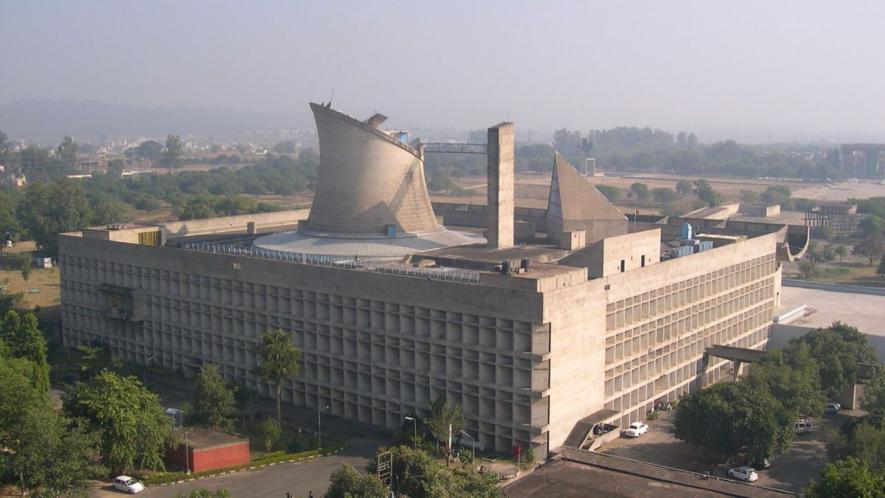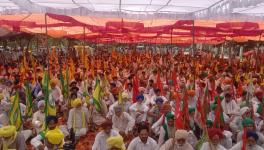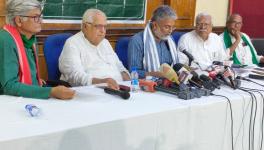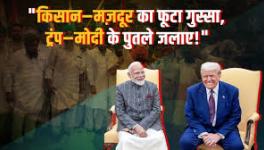Punjab: Why Proposed 'Law Against Blasphemy’ Needs to be Discarded

Image Courtesy: Flickr
Whether history will repeat itself, that is the question being asked about Punjab government’s renewed attempt to enact a law supposedly against 'sacrilege'?
Anyone who is a keen observer of the social-political developments in the state knows very well that it has a history of such efforts (2015 and 2018) where similar attempts were made to amend laws related to sacrilege, and both attempts proved unsuccessful as they failed on the yardstick of constitutionality.
As per reports, the proposed Punjab Prevention of Offences against Holy Scriptures Bill, 2025 (PPOHS Act), which was recently referred by the state legislature to a committee for further discussion, has come under the scanner of experts of the Constitution and concerned citizens.
A leading voice among them, namely the Constitutional Conduct Group (CCG) -- a platform of retired civil servants and diplomats-- has in an open communication underlined how Punjab government’s proposed 'PPOHS Act' is ‘unconstitutional’ and is an ‘open invitation to oppressive misuse’ .
Their communication underlines how Punjab’s move 'to enact a Special Law supplementing Section 299 of the BNS constitutes an assault on India’s democratic and constitutional foundations' as it adopts a 'loosely and broadly constructed definitions of “Holy Scripture” and “Offences,” which 'abandons the basic jurisprudential safeguards of criminal justice.'
Emphasising the basic tenets of constitutional democracy, they further bring forth how in such experiments '[s]tatutes prescribing draconian punishments, such as life imprisonment and severe monetary penalties, must stipulate the establishment of mens rea. The proposed Act discards this standard, extending criminal liability to even accidental or bona fide acts involving religious texts.' [-do-]
'Sacrilege' a Burning Issue in Punjab
It cannot be denied that ‘Sacrilege’ is still a burning issue in Punjab politics.
In 2015, incidents of ‘sacrilege’ of holy books has suddenly surged in the state, sparking massive demonstrations. Once, the police had to resort to firing, killing two protestors. The Akali Dal-Bharatiya Janata Party (BJP) government then ruling the state was on the defensive and passed a law in March 2016 that mandated a stringent life term (instead of three years in prison) for the crime.
That was a retrograde move, for it legitimised the politics of ‘hurt sentiments’ and pushed the idea of ‘blasphemy’ as a crime. It had overlooked the fact that how blasphemy laws can jeopardise freedom of thought and expression, and the state government did not consider the havoc such laws cause in many countries.
Earlier, the Punjab Bill had sought to amend the Indian Penal Code and Code of Criminal Procedure to punish the desecration of the Sikh holy text, Guru Granth Sahib. The Central government returned this Bill, citing the reason that it violated the principle of secularism.
When the Capt. Amarinder Singh-led Congress government came to power in 2017, it passed a new Bill that included scriptures of other religions, which the Centre approved. The Bill inserted Section 295AA in the IPC to provide that “whoever causes injury, damage or sacrilege to the Guru Granth Sahib, the Bhagvad Gita, the Quran and the Bible with the intention to hurt the religious feelings of the people, shall be punished with imprisonment for life.”
This expansion of blasphemy laws came under intense criticism, for, instead of making the state more distant from religion, it would “further consolidate the hold of sectarianism, and strengthen the hands of religious extremists on all sides”. Many pointed out that such laws are were being misused the world over “against minorities and weaker sections, to harass them, exact revenge and also to settle personal and professional quarrels, all matters entirely unrelated to blasphemy”.
How the spread of notions of blasphemy and laws to prevent it can play havoc with ordinary people, can be discerned from Punjab's own recent history.
In 2016, two women, both named Balwinder Kaur, were killed over alleged acts of blasphemy. Balwinder, 55, was killed in her home in village Veroke, Amritsar, on September 9, while on bail. She was jailed in November 2015 allegedly for ‘desecration’ of holy scripture and was out on bail. The police had arrested her for allegedly entering a gurudwara wearing slippers, which was fanned into a major issue. The village socially boycotted her family for months. In the end, it is her husband who killed her, apparently over the “infamy” she had drawn to the family.
The other Balwinder Kaur, 47, of village Ghawadi was killed by fanatics, also while on bail. She used to work in a gurudwara and got charged with having “torn the pages of the Guru Granth Sahib”. Her family alleged that dominant residents had trapped her. Two persons, who belonged to a radical Sikh outfit, were arrested in connection with the crime.
Merely two years ago, a woman was killed inside a gurudwara in Patiala by a visitor, allegedly for drinking alcohol there as her act had 'violated his religious sentiments'. It was further shocking to know that the leading body of Sikhs even offered free legal aid to the murderer who allegedly justified his actions under the specious plea that his actions were an 'impulsive response as his religious sentiments were violated.'
Judicial intervention in a few cases related to ‘be-adabi’ or insult of religious texts, and Special Investigation Teams have not resolved the issue but further complicated it. A reason for the Amarinder Singh-Navjot Singh Sidhu acrimony was also the allegation that the state had not dealt with desecration-related cases. Even for the Akali Dal-BJP alliance, sacrilege was a big issue that caused massive losses in the 2017 Assembly election. The results of the 2019 Lok Sabha election from Punjab were no different.
No More Pandering to Extremist Sentiments
Anyone would recall that this issue had also suddenly cropped up during the historic farmers movement when a Dalit Sikh worker, Lakhbir Singh from Punjab, was accused of ‘sacrilege’ by a group of Nihangs. He was allegedly tortured and killed at the Singhu border, one of the centres of resistance for the historic farmer’s struggle.
The leaders of the farmer movement had immediately condemned the killings and asked the government to punish the guilty. Refusing to get carried away by sectarian rhetoric, they had continued their struggle.
May be, by now a thorough investigation into the case has been completed and the masterminds and perpetrators of Lakhbir’s murder have been identified. But in the charged atmosphere of the historic farmers’ movement, killing in the name of faith had definitely raised tensions.
It was also then said that Lakhbir’s killing over alleged ‘sacrilege’, a burning topic in Punjab, could very well had been a ploy to drive a wedge between his community and the Jat Sikhs. Speculations were high since that was the time when Punjab had got its first Dalit Sikh Chief Minister in Charanjit Singh Channi, which had already caused consternation in multiple quarters.
Perhaps in this connection, the caution shared by the Constitutional Conduct Group becomes urgent, which they have boldly expressed regarding the proposed Bill.
Explaining the grounds for their opposition to the proposed law and explaining why we need to be extra cautious looking at our own history what they had said is worth reiterating:
“[T]he nation has already paid a heavy price for our past sins of pandering to extremist sentiments of various religions for short-term political ends. This has brought about a situation today where the very idea of an inclusive, pluralistic and liberal India and Indian-ness is endangered. The empowerment of sectarian and illiberal ideas and ideologies has resulted in the targeting of minorities and a general increase in social disharmony. The need of the hour is for all responsible stakeholders to act to reduce the space provided to religious fundamentalists of all kind – not open up further space to them.”
In an ambience where mixing of faith with politics is being rewarded at various levels, it remains to be seen whether we will have enough patience to listen to these saner voices, who are keen to uphold principles and values of our Constitution in these fraught times.
The writer is a senior independent journalist. The views are personal.
Get the latest reports & analysis with people's perspective on Protests, movements & deep analytical videos, discussions of the current affairs in your Telegram app. Subscribe to NewsClick's Telegram channel & get Real-Time updates on stories, as they get published on our website.
























